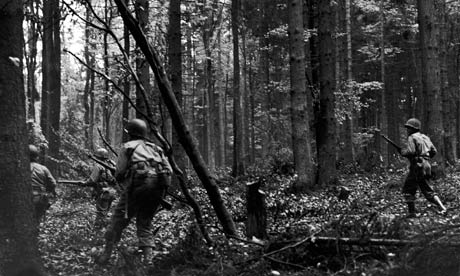
American infantrymen in the Hürtgen Forest, Germany, 2 November 1944: 24,000 died there in three months. Photograph: Time Life Pictures/Getty
What Folly That The US Prefers To Celebrate Its Victories, Like D-Day, Rather Than Learn From Its Disasters, Like Hürtgen
By Clancy Sigal
Saturday 2 June 2012 10.00 EDT
Courtesy Of "The Guardian"
After the real Normandy invasion, American commanders, high on victories, were anxious to attack Hitler's Siegfried Line, a series of defensive positions along the German border that were concrete bunkers protected by antitank obstacles and mines, and by motivated, battle-hardened Wehrmacht troops. The idiot's plan was to frontally advance through a 70-mile-square dark Hürtgen forest, near Aachen, during the worst winter on record.
The forest trees had been planted so deliberately close together that visibility was almost zero – except for previously zeroed-in mortars andMaschinengewehr. The stupidest private soldier could have told the US brass that flanking the thickly wooded hills – going around it – would be more productive tactically and less destructive of the 24,000 Americans who died trying to take this piece of militarily valueless real estate.
I know about this disaster because I joined one of its lead elements, the Fourth Infantry Division, after they returned from Europe, decimated and shellshocked, and I had a chance to talk to survivors. At one point, the Fourth's 22nd Regiment suffered 80% casualties; some of its companies took nearly 200% dead and wounded – that is every soldier had to be replaced twice over, usually by gormless trainees like me. Hardly a squad leader, sergeant or young lieutenant survived. (See the late Paul Fussell's The Boys' Crusade: American Infantry in Northwestern Europe.)
The three-month battle of the Hürtgen Forest, the longest battle in US military history – marked by mud, snow, misery, desertions, unheard-of GI casualties and top brass incompetence – is a historical stepchild swept aside for more glorious encounters like D-Day and the Battle of the Bulge.
From September to November 1944, in the dark, mysterious, Grimm-like "haunted wood", summer-uniformed, under-armed, ill-supplied GIs, mostly unsupported by artillery and weathered-in air, without maps and unable to see one another in the jungle-like, mine-planted forest, were shredded by murderous tree-bursts for which they'd not been trained and flung blindly into repeated attacks by uncoordinated "command and control" officers issuing dumb orders from the rear. Understandably, if they lived, they preferred not to talk about it to civilians. Official military histories, which infantryman-scholar Fussell called "a masterpiece of omission, evasion and cheerful euphemism", simply erased Hürtgen altogether.
Top officers responsible for the fiasco – Ike Eisenhower, Omar Bradley, Courtney Hodges and Lawton Collins, among them – went on to honored retirement. Bradley, who became a "wise man" adviser to President Lyndon Johnson, strongly recommended against withdrawing from theVietnam war. They never learn.
It depends on whether you're looking at it from inside a shell-blasted foxhole, like the wounded veteran Fussell, or from an elegantly-drawn map in a warm chateau miles away from the freezing front, which you find reasons not to visit and see for yourself.
Ernest Hemingway, a civilian journalist and an invalided veteran from the Great War, wanted to see what the hell was going on. So he armed himself with a submachine gun (against the Geneva Convention) and invited himself to the Hürtgen battle with the Fourth Division's 22nd Infantry Regiment. He took one look at this killing field, mud up to the axles, and GI foxholes useless under vertical shell explosions, and knew instantly what the generals refused to admit, that it was the first world war's Passchendaele disaster all over again: brass sacrificing khaki for their greater glory.
An exception to the rule of generals covering their asses was James Gavin, commander of the 82nd Airborne, who always jumped into combat with his men and carried the enlisted man's weapon, the M-1 Garand. He broke ranks to admit:
"For us, the Hürtgen was one of the most costly, most unproductive, and most ill-advised battles that our army has ever fought."
If only "Jumpin' Jim" Gavin, who understood the costs of combat, was still around to counsel Barack Obama about the lessons of Hürtgen and perhaps gently guide our commander-in-chief away from his current love affair with high-tech, kill-at-a-distance drone warfare – so bloodless, so intellectual, so glory-seeking … and so self-defeating. Obama, who, his aides tell us, has a "death list" printed on baseball cards listing which foreign enemies (and/or family) to obliterate with his thunderbolts, would have been at home at the battle of Hürtgen, behind the lines in some distant war room, poring over a map and brooding, brooding.
No comments:
Post a Comment